4 Apr 2014 | Europe and Central Asia, Events, United Kingdom
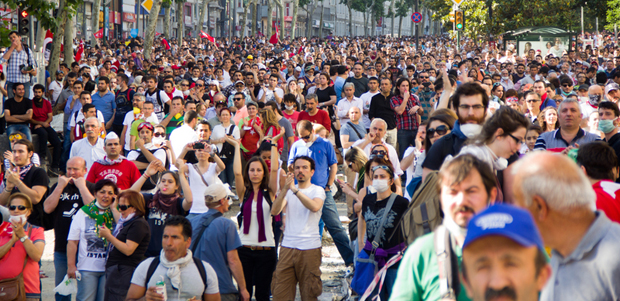
Thousands of protesters took to the streets of Istanbul on 1 June in the capital’s Taksim Square during demonstrations over plans to turn Gezi Park into a shopping mall. (Photo: Akin Aydinli / Demotix)
Protests are commonplace in many democracies all over the world, but in the last year there have been several limitations and blockades made to this right. From the protests on several university campuses, to those in Istanbul’s Gezi Park, to the more recent protests in the Ukraine, the world has seen that the right to assembly can still be seen as a direct threat to the authorities and one they wish to suppress. However, are there ever instances when protests should be suppressed, whether because they put the population at risk or are representing an extremist ideology at odds with the rest of society?
Index on Censorship and Sussex University Politics Society are hosting a panel debate to look at the importance of the right to assembly to freedom of expression at Sussex and around the world.
The panel will be a diverse range of free speech experts, and media, academic and student representatives.
Join us on Tuesday 8th April at 6pm in Fulton 104 on Sussex University campus to debate and discuss these important issues.
5 Feb 2014 | Brazil, News and features, Politics and Society
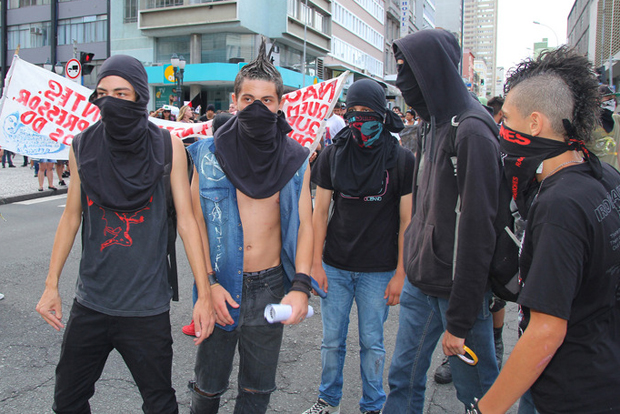
In Curitiba, about 300 protesters took to the streets of the central city asking for more health and safety improvements in the country and against the hosting of the World Cup 2014 in Brazil. Photo: João Frigério / Demotix
In the wake of mass protests sparked by rising transport fares in 2013, Brazil has embraced measures aimed at containing protests. One of the most controversial bans the use of masks during demonstrations.
Approved by the governor of Rio de Janeiro, Sergio Cabral, Act 6.528 stipulates that it is “especially forbidden” to wear masks or other means to prevent identification of protesters. The criminalization of masks was also adopted by the state of Pernambuco and cities across the country without legislative consideration. Act 6.528 also contains a provision that requires telephone companies and internet service providers to respond within 24 hours to police requests for information about masked demonstrators that have been arrested.
The Rio de Janeiro law not only prohibits masks: hoods, scarves or anything that hides the face of demonstrators is likely to draw the attention of security services. Protesters who refuse to remove their mask are taken to a police station to be photographed and fingerprinted for identification.
While violence was limited to small groups during the mass protests that target social inequality, official corruption and the staggering cost of the 2014 Brazil World Cup venues, the Brazilian media has routinely showed photos of masked participants and labelled them as “vandals”, “rioters” and “anarchists”.
Authorities say the mask ban is justified and necessary to protect public and private property from “criminals” and in the name of “public safety”. But some Brazilian lawyers say the ban is a fundamental violation of civil rights and is a dangerous precedent for the country’s democracy.
Specifically, legal specialists say, the prohibition violates Article 5 of Brazil’s federal constitution. In September, the National Human Rights Commission of the Ordem dos Advogados do Brazil challenged the mask ban in court. Another legal challenge has been filed in Rio de Janeiro state as the law “prevents the citizen’s right to free expression”. So far, neither challenge has had any effect.
Human rights organizations claim that the prohibition is an extreme violation of freedom of expression and charge the government with authoritarian motives. Amnesty International has called on the government to respect the right to protest, and halt the arbitrary arrests and criminalization of protester, since the actions are a violation of Brazil’s constitution. Further, Amnesty says, the ban endangers the fundamental principles of a democratic state and are “typical of authoritarian regimes”.
In late January, demonstrations against the World Cup took place in 14 cities – led by hundreds of masked protesters. In Sao Paulo alone, more than a 100 people were arrested. One unmasked protester, Fabrizio Proteus, was shot twice and interrogated by police officers while he was still in intensive care. Activists claim the interrogation and the information he provided was illegal.
For her part, Brazil’s president, Dilma Rousseff, who is worried about elections, is backing an extensive advertising campaign to defend the World Cup. Public spending on the event has topped 8 billion Reais or £2.032 billion. Critics of the government spending have formed a movement under the banner of “Nao Vai Ter Copa”, “No World Cup”, to cause agitation against the games. The president’s advisors say new mass protests may have a negative impact on her re-election plans. In 2013, Rousseff’s popularity ratings fell over 20 per cent during the protests.
In the meantime, the Federal Police and the Agência Brasileira de Inteligência (Brazilian Intelligence Agency – Abin) are scanning the internet, especially on social networks, in search of “agitators” and suspects.
Everything indicates that repression has just begun.
This article was originally published on 5 February 2014 at indexoncensorship.org
16 Jan 2014 | Europe and Central Asia, News and features, Ukraine
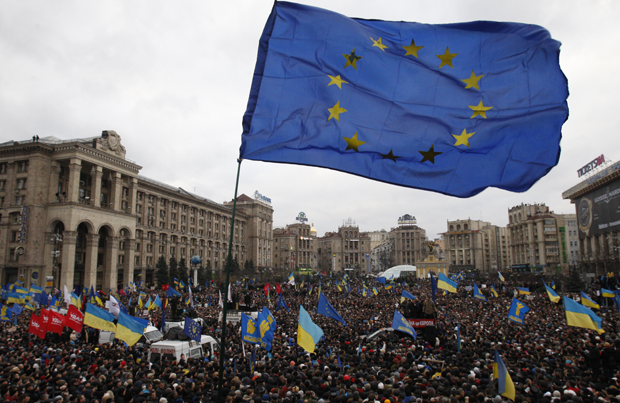
(Photo: Anatolii Stepanov / Demotix)
The Ukrainian parliament has adopted a new repressive law that seriously restricts freedom of expression and assembly, in a move the country’s civil society calls “a constitutional coup d’état”.
Law No. 3879, which enters into force tomorrow, criminalises libel (with a maximum sentence of two years of limited freedom), introduces criminal liability for “distribution of extremist materials”, allows blocking of websites and creates a Russian-style “foreign agent” definition for NGOs that use foreign funding.
Criminal liability for defamation and dissemination of extremist materials includes content posted online. The National Commission of State Regulation of Communication and Informatisation has the right to restrict access to websites “that are considered by experts to contain information that breaks the law.” Internet service providers will be obliged to buy special equipment to allow security services to monitor the internet and to restrict the access “to websites of information agencies that have no state registration.”
The law also requires mobile operators to identify SIM-cards owners; to buy a mobile contract one will have to present a passport and sign a formal contract.
The freedom of peaceful assembly is also threatened. In particular, the law forbids taking part in protests while wearing a helmet or a mask. Participating in a motorcade of five or more cars will lead to a fine and confiscation of the cars.
As the opposition tried to block the adoption of the draft law, the pro-government majority voted for the new legislative act with a simple show of hands, and without any discussion. The urgency of the law was explained by “a significant aggravation of [the] political and social crisis” in Ukraine.
“The law has been adopted by breaking all procedure rules. In fact it is a constitutional coup d’état that restricts fundamental freedoms and rights in Ukraine,” Olexandra Matviychuk, the chairperson of the Centre for Civil Liberties, told Index.
The restrictions outlined by the new law are aimed at civil society activists involved in the peaceful protests that started in Ukraine in November 2013 after the government refused to sign an association agreement with the EU.
This article was posted on 16 Jan 2014 at indexoncensorship.org
3 Jun 2013 | Europe and Central Asia
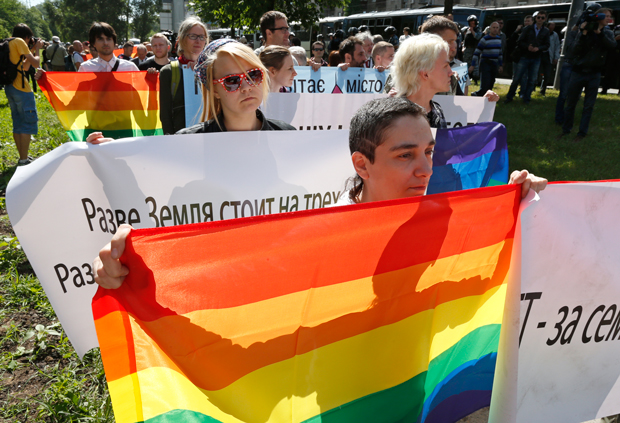
Despite intolerance and government suppression, LGBT supporters held the first gay pride march in the Ukraine. (Photos: Ivan Chernichkin for Index on Censorship)
Despite an initial ban by the authorities, Ukraine successfully held the country’s first ever gay pride parade but the level of intimidation faced by the lesbian, gay, bisexual and transgender community and proposed legislation outlawing ‘homosexual propaganda’ are causing concern for many. Andrew Connelly reports from Kiev
Last week, around 50 LGBT activists gathered on the outskirts of the Ukrainian capital Kiev to conduct the first ever equality march in the post-Soviet nation’s history. The event took place amidst an unprecedented amount of security with several hundred riot police and Special Forces drafted in to protect participants from thousands of protesters from the Orthodox Church, Ukrainian and Russian nationalists and football hooligans.
The parade was originally planned to take place in the centre of town, beginning at Independence Square, the scene of Ukraine’s 2004 Orange Revolution which (temporarily) overthrew pro-Russian President Victor Yanukovich. However, the Kiev district city court banned the event citing the clash with Kiev Day, a series of cultural events held across the city. In reality it would seem that, whilst this was a consideration, the amount of anti-LGBT demonstrators that also submitted applications to hold parallel marches may have more profoundly influenced the authorities’ decision. Still, the move was enough to prompt organiser Stas Mischenko to accuse them of “depriving our right to freedom of assembly” and an alternative location had to be hastily arranged.
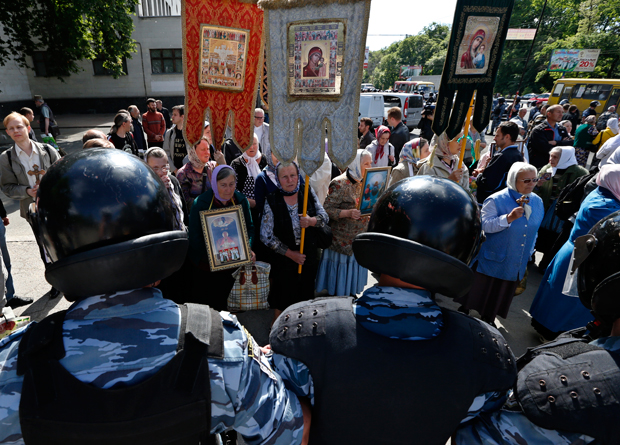
Counter demonstrators waved religious banners.
Despite the new site being kept secret, hundreds of crucifix-wielding protesters descended on Victory Avenue, waving banners with expressions such as ‘Kiev is not Sodom’ and ‘Homosexuality = Paedophilia’. LGBT activists were surrounded by lines of police yet the march was still intermittently disrupted when extremists managed to infiltrate the area, attempted to tear down banners and screamed ‘gays out of Ukraine’ and other epithets as they were dragged away into police vans. One firework was thrown that exploded in the middle of the crowd but nobody was injured. In total thirteen arrests were made.
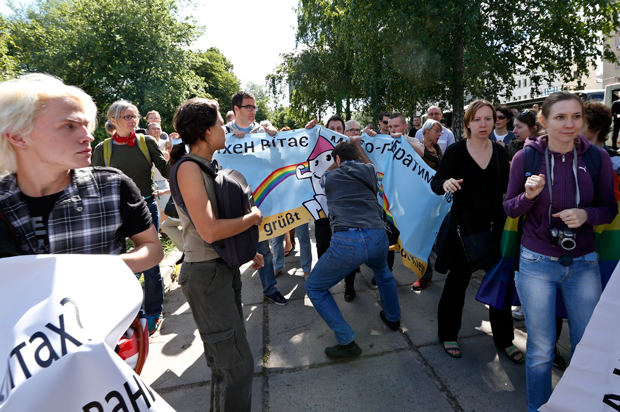
Opponents of the gay pride march attempted to disrupt by tearing down banners.
Nevertheless, the occasion was a marked improvement from last year’s attempt to organise a parade which was cancelled when police withdrew their guarantee of security an hour before the start due to threats from far-right hooligans planning to disrupt the event. Organiser Syvatoslav Sheremet was pepper sprayed then viciously attacked by thugs resulting in his hospitalisation.
Despite being the first post-Soviet country to legalise homosexuality, it remains a strongly taboo subject in Ukrainian society. There are almost no publicly gay figures and legislation does not recognise discrimination based on sexual orientation or gender identity. Ukrainian civil society groups are trying to press for anti-discrimination legislation at the same time as resisting two draft laws that would marginalise and severely infringe the rights of the LGBT community in addition to having a chilling effect of the freedom of the press.
Law 0945 concerns “the protection of children’s right to a safe information space” and proposes a ban on the production and publication of content which “promotes” and propagates” homosexuality that extends to the use of TV, radio, printing of publications, creative writings, cinematography or video materials.
Related: Shutting down Russia’s LGBT community
Elena Vlasenko reports on the continuing official campaign against lesbians and gays.
If this wasn’t authoritarian enough, Law 1155 is even more detailed, far reaching and restrictive in nature, calling for the “prohibition of propaganda of same-sex relationships aimed at children” defining homosexual propaganda as “intentional activity which aims to and is expressed in dissemination of any positive information about same-sex relations which could negatively affect…the development of the child including forming a misconception of traditional and non-traditional marriage relations being equal, and in the future impact his or her choice of sexual orientation.” This extends to a ban on media disseminating information from others that portrays same-sex relations in a positive light. Olena Shevchenko, head of the Kiev-based LGBT NGO Insight, outlines what this means in real terms:
“If you encourage a group of people to read a book of Oscar Wilde, it will be propaganda. If I give an interview in the mass media, openly say that I am a lesbian and that I think that it is normal, just like heterosexuality, then that will also be propaganda.”
Svitlana Tuchynska is a journalist at the Kyiv Post:
“If this law passes it will introduce media censorship. You will not be able to cover any activities of the LGBT community at all, any problems that they face or any opinions they have on their sexuality.”
The list of criteria is extensive, covering demonstrations, mass gatherings, workshops and classes amongst other public meetings. Violations of the law may result in fines reaching up to €2,400 or jail sentences of up to six years
“This legislation will affect us because we are spreading information about homosexuality amongst LGBT and the general population, that’s part of our job and this will definitely be considered propaganda”, Kiev Pride organiser and Vice President of Gay Alliance Ukraine Stas Mischenko explained.
“Such laws are very dangerous because I work in HIV prevention and people who are living under these harsh conditions don’t take care of themselves. They hear from other people that they are second class and they have no future, so they have risky sexual behaviour. If you are not able to explain to them that they are normal and good people, they will have more risky behaviour and the level of HIV will double or triple”, Mischenko said.
Ukraine currently has the highest HIV infection rate in Europe.
Hostile attitudes towards sexual minorities remains deeply rooted in Ukrainian society and these prejudices are now legitimised in parliament. Following the 2010 elections, the ultranationalist Svoboda (Freedom) party won 10% of the popular vote and have since stirred up homophobic, anti-Semitic and xenophobic sentiment in the country. In December 2012, an LGBT protest was disrupted by activists from the party who tear gassed and assaulted demonstrators, one of whom received a broken nose. On the official Svoboda website, a spokesman boasted of “breaking up the Sabbath of perverts”. Hate crimes are not legally recognised as such and are often referred to as ‘hooliganism’ with perpetrators rarely brought to justice.
The government in Kiev is currently deliberating whether to choose closer integration with Europe or to strengthen ties with Russia, but for Ukraine’s LGBT community the proposed propaganda legislation risks dragging the country to a much darker place entirely.






